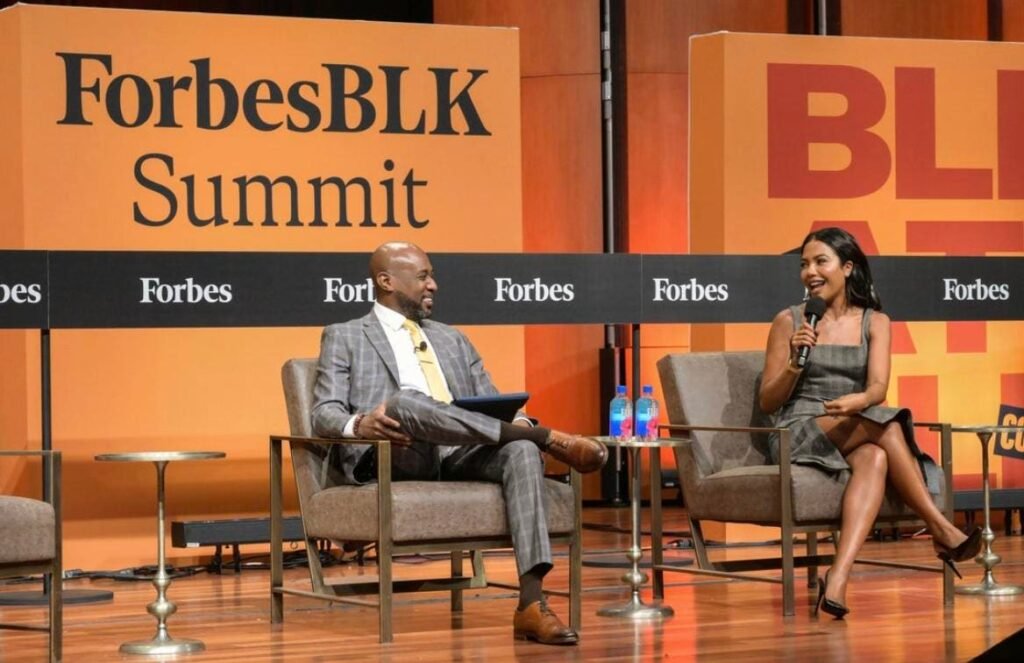Reported by Asia Alexander
A
ll eyes are on Morehouse College in Atlanta, Georgia this week as Forbes hosts the third annual ForbesBLK Summit—a powerful gathering of Black changemakers, innovators and leaders shaping the future of business and culture.
“As we dive in today, just remember the Summit isn’t just about exchanging ideas. It’s about creating real and meaningful connections,” said Ayisha Mendez, community manager of ForbesBLK, welcoming the audience. “It’s about sharing those ideas and making sure we push forward as a collective in a time where collaboration and innovation are more important than ever.”
Before attendees gathered for a day of panels and firesides, ForbesBLK members spent Wednesday volunteering across Atlanta, giving back to the community through local service projects that reflected the Summit’s mission of empowerment and connection.
With the theme “Today’s Challenges, Tomorrow’s Opportunity: A New Path to Economic Prosperity,” the Summit challenges Black business leaders to chart what’s next as entrepreneurship and creativity continue to shape global culture.
Skims Cofounder Emma Grede Built A $405M Million Empire, Starting With A Sandwich
“Life has chapters,” said Emma Grede during a fireside chat with Jabari Young, senior writer at Forbes and editorial lead for ForbesBLK.
Grede, now founding partner and chief product officer of Skims, shared how her career started with a moment of everyday excellence. “I got my first work experience because I made the best sandwich,” she said. “A woman who worked in fashion PR, Alex Silver, used to come in and wait for me to make hers. One day she said, ‘I’m going to wait for that girl,’ and that’s how I got my start. Whatever you do, approach it with excellence.”
She added that the same mindset continues to guide her success. “I think I operate on a set of principles, and one of my principles is to always be in learning mode, because you don’t know what you don’t know,” she said. “More than anything, it’s about flexibility — flexibility of thought, flexibility of style, flexibility to open your mind and figure out what might be the next big thing.”
Named one of America’s Richest Self-Made Women by Forbes in 2025, Grede is worth an estimated $405 million. Most of her fortune comes from Skims, but she is also the CEO and cofounder of denim brand Good American, which made history with a $1 million launch day in 2016.
Beyond Skims and Good American, Grede’s ventures include Frame, Cakes Body, and collaborations with the NFL, Fanatics, and Kristin Juszczyk. She also sits on the Obama Foundation board and hosts her podcast Aspire with Emma Grede.
Flying Cars By 2050? Experts Say The Future Of Travel Is Closer Than You Think
“Soon, maybe in 30 years or so, there will be flying cars,” said Forbes Senior Writer Jabari Young, opening the Future of Transportation panel at the ForbesBLK Summit. He referenced a Morgan Stanley estimate valuing the urban air mobility market at $9 trillion by 2050, noting that the future of travel is already taking shape.
The conversation featured Josh Aviv, founder and CEO of SparkCharge, and Sondra Sutton Phung, General Manager of Global Truck at Ford Motor Company. Both agreed that innovation must be paired with access and safety. “The future is electric,” said Aviv, emphasizing that electrification is not a trend but a transition already underway. Phung added, “What I see in the future is absolutely a flying car… It’s not a matter of can it be done, it’s about when it will be done and what infrastructure will be required to actually make it happen.”
The panel also examined how shifting government policies could shape EV adoption. “When we think about electrification here in the United States, the first thing we did was make it very political instead of focusing on the dollar and the penny,” Aviv said. “Owning an electric vehicle saves money—it’s low maintenance, cheaper to fuel, and the experience is better than owning a gas vehicle.” He added that fleets, too, are increasingly switching to EVs because of the lower costs. “On a global scale,” Aviv concluded, “we’re playing defense instead of offense, but electrification isn’t slowing down—it’s only gaining ground.”
